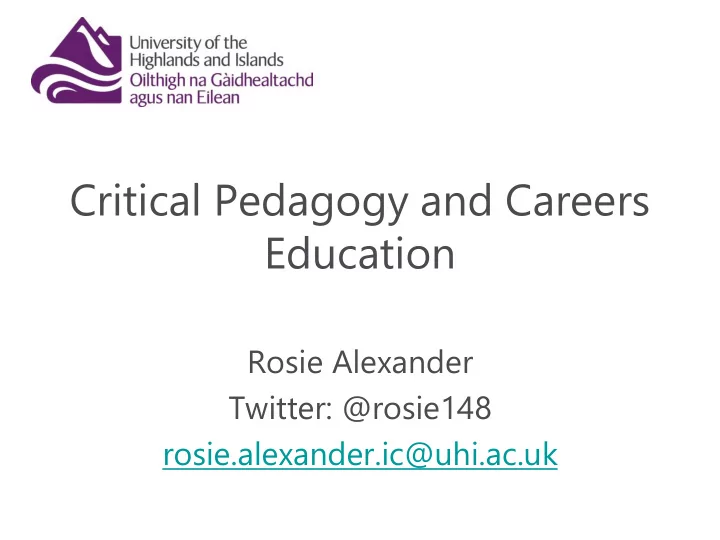

Critical Pedagogy and Careers Education Rosie Alexander Twitter: @rosie148 rosie.alexander.ic@uhi.ac.uk
Structure of today’s session • Why are you here? • Why am I here? • Traditional approaches to careers education • Radical and critical approaches • Some examples and ideas
Why are you here?
Why am I here? Photo courtesy of Ronnie Robertson via Flickr Research into the career and migration pathways of higher education students from Orkney and Shetland
Recognises that people aren’t equally mobile - links to inequality in the workplace
Inequality in the workplace How is inequality perpetuated? • Unpaid internships • Requirement for experience for entry level work • Low paid sectors • Cultural capital • Social capital https://www.bbc.co.uk/news/education-48745333
Recognising that people make different choices.
Social justice • Recognising inequalities and differences between graduate trajectories, how can we work ethically as practitioners and educators? • Do our existing approaches risk reinforcing inequality?
Some things you might hear said…
Careers guidance risks • Focus on individuals • Individual qualities and skills are determinants of success in the workplace • Risk that ‘failure’ is internalised as a personal deficiency even where there are significant structural barriers
Context awareness and community embeddedness
Careers (or employability) education in HE Do we need to consider not just how to help students ‘play the game’ but raise their awareness of their contexts and help them to ‘change the game’?
Critical pedagogy • Draws on Friere: Pedagogy of the Oppressed • Aim of education should not be to replicate power systems • Education should help students recognise and critically engage with their contexts and challenge inequalities
What is a career?
‘other careers’ Deconstructing and Reconstructing notion of ‘career’ Ribeiro, & Fonçatti (2018)
Conclusions • How are we currently supporting our students? • Are we reinforcing problematic ideas about careers and the workplace? • How inclusive are we in the ways we present careers and employability? • How can we help students to increase their understandings of their context and the careers they wish to enter? • How can we help students to critically engage with their context and the careers they wish to enter? • How can we teach them to ‘play the game’ and potentially to ‘change the game’?
Bibliography • Brinkmann, S. (2017) Stand Firm: Resisting the self-improvement craze. Cambridge, Polity Press • Friere, P. (1970) Pedagogy of the Oppressed. New York: Continuum • Friedman, S. & Laurison, D. (2019) The Class Ceiling: Why it pays to be privileged. Bristol: Policy press. • Hooley, H; Sultana, R. G., Thomsen, R. (2018) Career guidance for Social Justice: Contesting Neoliberalism. Oxon, Routledge • Precarious workers brigade (2017) Training for Exploitation: Politicising Employability and Reclaiming Education. Available from: https://precariousworkersbrigade.tumblr.com/texts • Ribeiro, & Fonçatti (2018) ‘The Gap between theory and context as a generator of social injustice: seeking to confront social inequality in Brazil through Careers Guidance’ in Hooley, Sultana and Thomsen (2018) • Thomsen, R. (2012) Career guidance in communities. Aarhus: Aarhus University
Recommend
More recommend